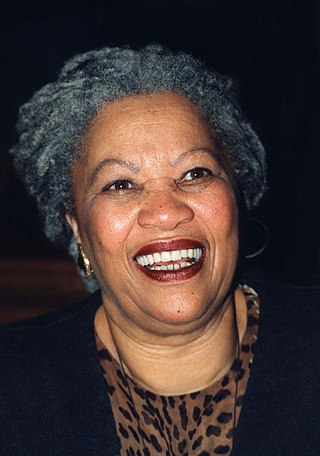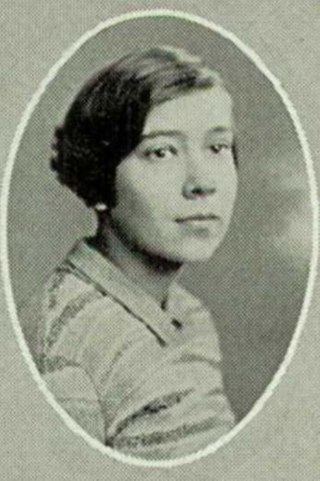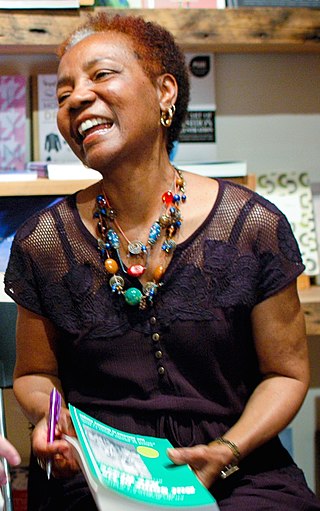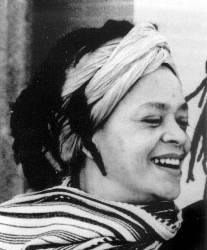
Chloe Anthony Wofford Morrison, known as Toni Morrison, was an American novelist and editor. Her first novel, The Bluest Eye, was published in 1970. The critically acclaimed Song of Solomon (1977) brought her national attention and won the National Book Critics Circle Award. In 1988, Morrison won the Pulitzer Prize for Beloved (1987); she was awarded the Nobel Prize in Literature in 1993.

Julie Ethel Dash is an American filmmaker, music video and commercial director, author, and website producer. Dash received her MFA in 1985 at the UCLA Film School and is one of the graduates and filmmakers known as the L.A. Rebellion. The L.A. Rebellion refers to the first African and African-American students who studied film at UCLA. Through their collective efforts, they sought to put an end to the prejudices of Hollywood by creating experimental and unconventional films. The main goal of these films was to create original Black stories and bring them to the main screens. After Dash had written and directed several shorts, her 1991 feature Daughters of the Dust became the first full-length film directed by an African-American woman to obtain general theatrical release in the United States. In 2004, Daughters of the Dust was named to the National Film Registry by the Library of Congress for its "cultural, historical and aesthetic significance". Stemming from the film's success, Dash also released novels of the same title in 1992 and 1999. The film was later a key inspiration for Beyoncé's 2016 album Lemonade.

Gloria Jean Watkins, better known by her pen name bell hooks, was an American author, theorist, educator, and social critic who was a Distinguished Professor in Residence at Berea College. She was best known for her writings on race, feminism, and class. She used the lower-case spelling of her name to decenter herself and draw attention to her work instead. The focus of hooks' writing was to explore the intersectionality of race, capitalism, and gender, and what she described as their ability to produce and perpetuate systems of oppression and class domination. She published around 40 books, including works that ranged from essays, poetry, and children's books. She published numerous scholarly articles, appeared in documentary films, and participated in public lectures. Her work addressed love, race, social class, gender, art, history, sexuality, mass media, and feminism.

Gloria Naylor was an American novelist, known for novels including The Women of Brewster Place (1982), Linden Hills (1985) and Mama Day (1988).
African American literature is the body of literature produced in the United States by writers of African descent. Olaudah Equiano was an African man who wrote The Interesting Narrative of the Life of Olaudah Equiano, an autobiography published in 1789 that became one of the first influential works about the transatlantic slave trade and the experiences of enslaved Africans. His work was published sixteen years after Phillis Wheatley's work. She was an enslaved African woman who became the first African American to publish a book of poetry, which was published in 1773. Her collection, was titled Poems on Various Subjects, Religious and Moral.
Bettina Fay Aptheker is an American political activist, radical feminist, professor and author. Aptheker was active in civil rights and anti-war movements of the 1960s and 1970s, and has since worked in developing feminist studies.
Michele Faith Wallace is a black feminist author, cultural critic, and daughter of artist Faith Ringgold. She is best known for her 1979 book Black Macho and the Myth of the Superwoman. Wallace's writings on literature, art, film, and popular culture have been widely published and have made her a leader of African-American intellectuals. She is a Professor of English at the City College of New York and the Graduate Center of the City University of New York (CUNY).
Black feminism is a branch of feminism that focuses on the African-American woman's experiences and recognizes the intersectionality of racism and sexism. Black feminism philosophy centers on the idea that "Black women are inherently valuable, that liberation is a necessity not as an adjunct to somebody else's but because of our need as human persons for autonomy."

Barbara Smith is an American lesbian feminist and socialist who has played a significant role in Black feminism in the United States. Since the early 1970s, she has been active as a scholar, activist, critic, lecturer, author, and publisher of Black feminist thought. She has also taught at numerous colleges and universities for 25 years. Smith's essays, reviews, articles, short stories and literary criticism have appeared in a range of publications, including The New York Times Book Review, The Black Scholar, Ms., Gay Community News, The Guardian, The Village Voice, Conditions and The Nation. She has a twin sister, Beverly Smith, who is also a lesbian feminist activist and writer.
Gia'na Garel is a writer, producer, filmmaker, composer and entertainment consultant based in New York City. From 2005 to 2009, she co-hosted an entertainment-oriented Air America Radio program, On the Real, with pioneer rap artist Chuck D.

Valerie Taylor was an American author of books published in the lesbian pulp fiction genre, as well as poetry and novels after the "golden age" of lesbian pulp fiction. She also published as Nacella Young, Francine Davenport, and Velma Tate. Her publishers included Naiad Press, Banned Books, Universal, Gold Medal Books, Womanpress, Ace and Midwood-Tower.

Tayari Jones is an American author and academic known for An American Marriage, which was a 2018 Oprah's Book Club Selection, and won the 2019 Women's Prize for Fiction. Jones is a graduate of Spelman College, the University of Iowa, and Arizona State University. She is currently a member of the English faculty in the College of Arts and Sciences at Emory University, and recently returned to her hometown of Atlanta after a decade in New York City. Jones was Andrew Dickson White Professor-at-large at Cornell University before becoming Charles Howard Candler Professor of Creative Writing at Emory University.

Azalea: A Magazine by Third World Lesbians was a quarterly periodical for Black, Asian, Latina, and Native American lesbians published between 1977 and 1983 by the Salsa Soul Sisters, Third World Wimmin Inc Collective. The Collective also published the Salsa Soul Sisters/Third World Women's Gay-zette.

Akasha Gloria Hull is an American poet, educator, writer, and critic whose work in African-American literature and as a Black feminist activist has helped shape Women's Studies. As one of the architects of Black Women's Studies, her scholarship and activism has increased the prestige, legitimacy, respect, and popularity of feminism and African-American studies.

The Salt Eaters is a 1980 novel, the first such work by Toni Cade Bambara. The novel is written in an experimental style and is explicitly political in tone, with several of the characters being veterans of the civil rights, feminist, and anti-war movements of the 1960s and 1970s. It is set in the fictional town of Claybourne, Georgia.

Louise Meriwether was an American novelist, essayist, journalist and activist, as well as a writer of biographies of historically important African Americans for children. She is best known for her first novel, Daddy Was a Number Runner (1970), which draws on autobiographical elements about growing up in Harlem, New York City, during the Depression and in the era after the Harlem Renaissance.
"Raymond's Run" is a short story by the American author Toni Cade Bambara, published as part of her collection Gorilla, My Love in 1972. The story concerns a young African-American girl's experiences as a talented sprinter and her relationship with her disabled brother.
Martha Modena Vertreace-Doody was an American poet, and author of short stories and articles on literature and teaching. She was Distinguished Professor of English and Poet-in-Residence at Kennedy-King College in Chicago.
Glory Okon Edim is a Nigerian-American writer and entrepreneur. She is best known as the founder of the reading network Well-Read Black Girl. Edim received the 2017 Innovator's Award at the Los Angeles Times Book Prize for her work.
Terri Lynn Jewell was an American author, poet and Black lesbian activist. She was the editor of The Black Woman’s Gumbo Ya-Ya, which received the New York City Library Young Persons Reading Award in 1994.











